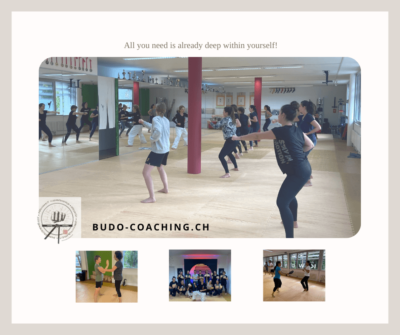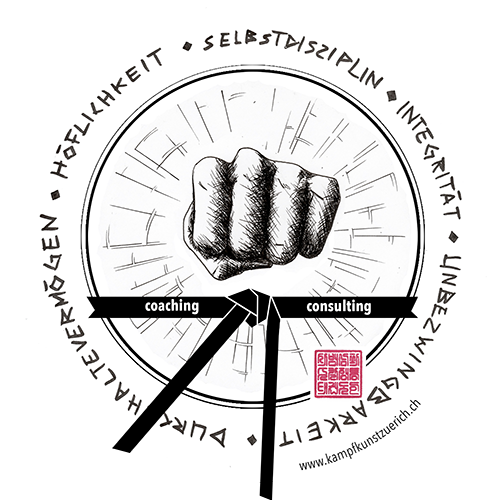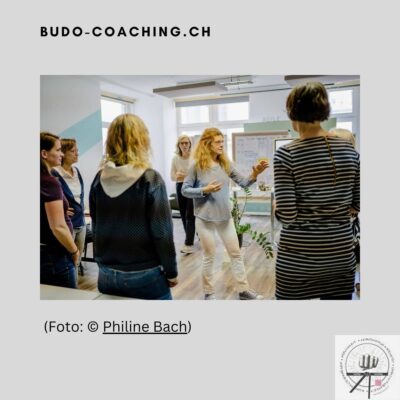Open up to your world of possibilities Do you find yourself constantly worrying about what…

Standing tall in word and deed: Championing your own cause
How self-assertion and self-defense effectively strengthen your communication skills
Maria, Hanna, Ronja stand in a dojo for the first time. They don’t know each other yet, but for various reasons, they share a common goal: they want to feel more secure internally, appear more confident, and learn to assert themselves.
Like them, more and more women in our Budo coaching are looking for ways to react more confidently in everyday situations and also to learn how to protect themselves from possible attacks.
But what lies behind the terms "self-defense" and "self-assertion"? And how do these courses help to become stronger not only physically but also mentally?
Self-defense begins long before an actual attack. To be able to react, you need to be very well self-aware, knowing your strength and weakness, sharpening the perception of yourself and your environment. This forms the basis for prevention and appropriate behavior.
Through the interplay of mental and physical training contents, it becomes possible to train confidence and assertivness in conflict situations.
Self-assertion is a prerequisite for successful self-defence
Those who assert themselves are able to stand up for themselves and express their own opinion. This is an important aspect in everyday communication, whether in interpersonal relationships, at work and in everyday interactions, especially when it comes to setting boundaries and respectfully declining requests with which you do not agree. It is about honouring your needs, trusting your abilities, setting boundaries and clearly communicating to others what you find acceptable and what not.
Self-assertion improves the way we communicate with others and enables more trusting relationships and interactions on an equal footing. Since this ability is not as distinctive in everyone, sometimes a little practice and collecting positive experiences to built self-trust first, are necessary.
Body language, voice, demeanour and mind-set significantly contribute to how you are perceived by others and are elements that are covered in a self-assertion course.
The first step towards more security is recognizing your own abilities. Many participants often know all about their own weaknesses but are amazed when they discover unexpected strengths in themselves, for example, through “stress exercises.”
It is important to be aware of our own resources, and also that these vary:
👉 How are we physically and mentally equipped?
👉To what extent do we know or pay attention to our body signals?
👉 How do you perceive your environment?
Our voice, our body, our thoughts are our constant companions and best shield- we should use them!
✅ Use your voice – it is powerful
• To express your needs
• To express your opinion
• To become visible
• To set boundaries
• To ask for help, not only when you are in danger! – You don’t have to do everything alone; get the support you need, even in your professional life.
✅ Define what you want
To be assertive, you must know yourself and know what you want and what you don’t. You should clearly define your goals, know your values, and know what you stand for. If you know yourself well, you can also communicate your needs clearly. The emphasis here is on YOU, i.e., what you want and not what you think others would like or expect from you.
✅ Regulate your emotions
To be assertive, we must learn to deal with our emotions and regulate them, especially in stressful situations. Only then are we able to stand up for ourselves and defend our position. Keeping calm can also be trained with practice.
✅ You are important, what you achieve is valuable
Be proud of what you do: false modesty is out of place when it comes to realizing your own professional goals. Occasionally look back on your successes and draw confidence from the fact that you are on the right path. You are an expert in your field – show it.
✅ Feeling insecure and powerless at work? It doesn’t have to be
Set boundaries! Setting boundaries is often difficult for most participants in our self-assertion courses. However, these are crucial to maintaining balance in any kind of relationship. Setting boundaries means maintaining one’s own identity, standing up for oneself, and protecting oneself mentally and physically.
It is often in the workplace, where “violence” is not suspected, that our customers encounter situations that burden them greatly – from bullying to unfair treatment towards them to exhaustion and (mostly) verbal boundary violations – and this in the most different work environments and industries, as the following examples illustrate.
Stepping up requires self-trust first
🧑⚕️Maria works as a nurse and has repeatedly been pushed to her limits – literally. Patients who went too far with inappropriate touches or comments made her life difficult.
👩🏫 Hanna is a teacher and her class is challenging. She often felt caught in a dilemma. She couldn’t provide freedom without losing respectful behavior and her authority. This stressed her enormously and almost led to a nervous breakdown.
Through the course, Hanna not only learned to set clear boundaries and appear confident, but also how important a strong sense of self-worth and clear communication are.
👩💼Ronja is a human resources manager in a multinational corporation and is often on business trips. She felt insecure in foreign countries and had a queasy feeling on the road. After being harassed by a drunken guest at the hotel, she decided to take the self-defense course and then to further invest in her own safety and well-being. She now regularly trains in fitness, mental, and physical strength for emergencies by learning Taekwondo.
A self-assertion course focuses on self-perception with the aim of building self-confidence and self-assurance to act appropriately and confidently in various situations. It is about recognising personal boundaries, communicating them and asserting personal opinions, speaking up when it needs be in social interactions.
In the self-defense course, the focus is on self-protection, prevention and on techniques which are easy to learn and remember when you need to react and counter attack. The main goals:
• Recognize potential dangerous situations and avoid them as much as possible
• To defend oneself in critical situations and
• Practice strategies for freeing oneself from various holds
• Deal with various threatening scenarios, play them out and “experience” them
In role-playing exercises, participants learn to identify potentially dangerous situations, to de-escalate them and to react and counter if necessary. The aim is to escape from a threatening situation unharmed, reacting quickly. The mental component is crucial in assault situations to remain capable of action despite fear and stress.
NO MEANS NO
❌💥 Be aware! Taking a course is by no means enough: it may be the starting point but the path to more safety goes through repetitions and training. The learned self-defense techniques must be firmly anchored. Therefore, in our training, we focus on strategies of active physical resistance that are simple, easy to perform and effective.
❌💥 An offender seeks victims, not opponents. To carry out his/her plan, an offender relies on three variables:
• Time – it must be quick
• Location – with no disturbance or witnesses
• Victim – no resistance is expected
Therefore, resist and react with all the resources available to you, disrupting the plan of your offender! If no other way out is possible, such as avoiding the situation, fleeing and getting help, actively defend yourself until the attacker ideally backs off and you can contact the police (in Switzerland dial 117 for police or 112 for emergencies). Every second counts especially the first bunch: according to statistics, many attackers are deterred by a strong, unexpected reaction and retreat.
❌💥 Learning to strike requires practice!
We showed a journalist in this short video, how a woman can defend herself. It includes tipps such as:
– Carry the key in hand to amplify the strike.
– Strike with anything at hand, such as your own bag.
– Kick and scratch, aiming for the face, ears, and eyes.
– Shout loudly to attract attention, for example, by breaking a window or pressing as many doorbells as possible.
– React immediately, without hesitation.
Not every woman finds it easy to strike – but also striking can be practiced: Whether it’s a punching bag or a stuffed pillow – just hit. Women have a higher threshold when it comes to physically defending themselves. Learning self-defense techniques and training under expert guidance helps to lower this threshold.
Do not leave your safety to chance
No one should ever experience threatening situations. Unfortunately, reality teaches us otherwise. Engaging with your own strength and abilities, getting physical and developing strategies for yourself is definitely recommended and helpful, even to overcome our small everyday “battles”.
Because where there are people, there are also conflicts. Whether we handle them with sovereignty instead of being overwhelmed, might require some practice.
Training in self-assertion helps to better cope with daily struggles, improves resilience and gradually leads to increased self-confidence.
Standing up for your own interests will no longer be an impossible task. Quite the contrary. When you learn self-assertion and self-defense, you learn to protect yourself, to stand firm and to convey to others that their interaction with you should be based on mutual respect. You feel stronger in words and deeds, and that’s what you radiate as well.
Maria, Hanna, and Ronja have experienced the transformative power of self-assertion and self-defense. In these courses, they not only trained practical skills for physical and verbal defense but also strengthened their own self-confidence and self-esteem; today, they feel a bit safer and they have made progress at work by standing their ground.
They faced a challenge and ultimately found the necessary resources to overcome their situation within themselves. Step by step, they continue to build their self-confidence muscles and successfully stand up for themselves.
Good to know: "No means no" was written on a poster of a campaign by the city of Zurich against harassment and disrespectful behaviour of any kind. We continue to participate in this important initiative of the city of Zurich. Our self-assertion and self-defense courses are supported by the city.



